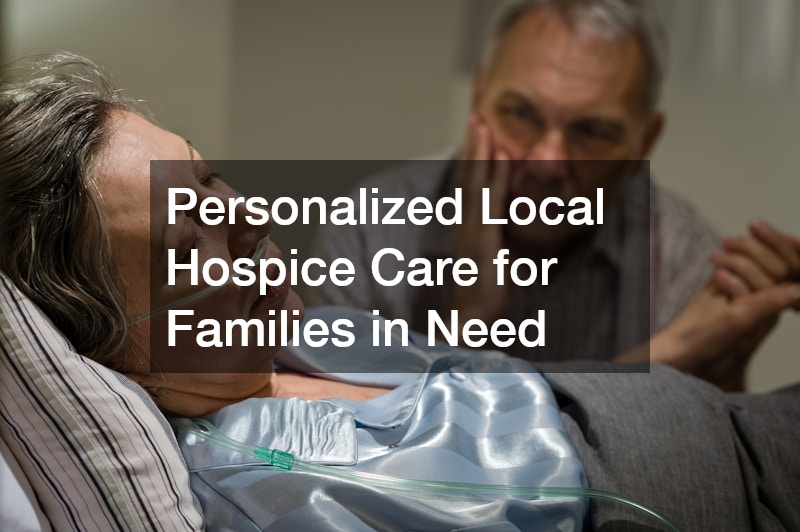Hospice care stands as a vital component for families navigating the final stages of a loved one’s life. It ensures that patients receive compassionate, personalized care tailored to their unique medical and emotional needs. Local hospice care, specifically, offers the benefit of localized interventions, making services more accessible and responsive to community-specific nuances. As more families acknowledge the role of personalized hospice services, understanding its comprehensive impact becomes increasingly important.
In many communities, hospice care is often seen as an essential service that bridges the gap between medical attention and emotional support. With personalized approaches, families can engage deeply with caregivers who understand cultural, emotional, and geographical contexts. This intimate knowledge fosters an atmosphere of trust and comfort, easing the burden during challenging times. Given this framework, patients and their families can focus on preserving dignity and cherishing moments together, knowing that their unique needs are being met.
Local hospice care also emphasizes community engagement, fostering relationships with local healthcare providers and resources. This collaboration allows for a seamless transition from curative treatment to comfort care, tailored to individual preferences. As the demand for personalized hospice services grows, the role of local providers becomes increasingly significant. Understanding these dynamics is crucial for families planning for or currently experiencing end-of-life caregiving.
The Scope of Local Hospice Services
Local hospice care services encompass a wide range of support systems designed to cater to varying patient needs. These services often include pain and symptom management, emotional and spiritual support, and assistance with daily activities. Personalized care plans are developed collaboratively with families, focusing on honoring patient wishes and enhancing the quality of life during the final stages. By working closely with local caregivers, families can ensure that their loved ones receive the highest standard of care tailored to their unique circumstances.
In addition to medical and personal care, local hospice services often extend support to family members, helping them navigate the emotional complexities of loss. Bereavement counseling and support groups are common offerings aimed at addressing the holistic needs of those left behind. With a focus on community-based approaches, these services often integrate activities and therapies that hold particular meaning in the local context. This broader scope ensures that all aspects of end-of-life care are addressed, leaving families feeling more supported and involved.
Local hospice care facilitates better coordination among healthcare providers, ensuring a continuity of care that is both effective and compassionate. This coordination is key in managing transitions between home settings, hospitals, and hospice facilities. Families benefit from having a singular point of contact who understands their journey and can advocate for their needs. The integration of localized resources ultimately enhances the caregiving experience, consistently meeting and exceeding expectations.
Benefits of Personalized Care in Local Hospice
One of the most profound benefits of personalized care in local hospice is the ability to receive care that respects individual values and preferences. This approach goes beyond mere medical treatment, recognizing the importance of emotional and cultural contexts that influence care decisions. By allowing space for personal wishes, hospice services can create a sanctity of experience, offering patients dignity and peace. The advantage of localized care is that it adapts readily to the traditions and customs of the community, making interactions more meaningful and less clinical.
Personalized care in local hospice actively involves family members in the caregiving process, fostering deeper connections and understanding. By participating in care plans and decision-making, families can advocate more effectively for their loved ones. This involvement reduces feelings of helplessness, allowing family members to contribute to the well-being and comfort of the patient. It also provides them with reassuring know-how that continues to be a source of empowerment through the complexities of end-of-life discussions.
Personalized hospice care is crucial in managing expectations while offering adaptability in unexpected scenarios. Flexible care plans can adjust according to sudden changes in health, ensuring that patient comfort remains a priority. By working closely with local experts familiar with family dynamics and community attributes, care can be adjusted in real-time, supporting dignity and continuity. This replicates a home-like environment where families are more at ease, deeply impacting the emotional landscape of final days.
The Community Impact of Local Hospice Care
Local hospice care not only supports individual families but also contributes to the broader health landscape of the community. By fostering relationships with local healthcare providers, these services integrate seamlessly into the existing network of care. This interconnectedness helps improve overall health outcomes, as caregivers collaborate to provide comprehensive support solutions. As a result, communities become more resilient and well-equipped to manage and respond to the healthcare needs of their members.
Community-based hospice initiatives often lead to increased health literacy and awareness among local populations. As families interact with care professionals, they acquire important knowledge about managing chronic conditions and end-of-life considerations. This informal education helps demystify many of the stigmas associated with hospice care, promoting a broader acceptance of palliative services. In this way, hospice care serves as a conduit for education and empowerment, fostering a more informed population.
Local hospice care providers often take on the role of community leaders, advocating for improvements in healthcare policy and resource allocation. Through these efforts, they work to address disparities in access to quality end-of-life care, ensuring all community members have the support they need. This advocacy is integral to building a supportive healthcare ecosystem that prioritizes compassionate, patient-centered care. Ultimately, the influence of local hospice care extends beyond individual homes, enriching the entire community and fostering a culture of care.
The Future of Local Hospice Care
The evolution of personalized hospice care signifies a promising trend towards more compassionate, community-centered end-of-life care. As it stands, local hospice care offerings are poised to expand, reflecting growing demand for comprehensive, empathetic support systems. Families engaging with these services can take comfort in knowing they are part of a broader community effort to provide dignity and peace in end-of-life scenarios. This endeavor not only benefits individual patients but also reinforces the strength and resilience of entire communities.
Looking ahead, advancements in medical technology and communication will continue to transform hospice care models, integrating innovation with tradition. These changes will likely increase accessibility and efficiency, enabling care providers to serve more families with varying needs. However, at the heart of these developments remains a steadfast commitment to personalized care and the principles of empathy and respect. As such, these evolving services will continue to support families, preserving the legacy of loved ones in the context of community-specific values.
Ultimately, the dedication to personalized and local approaches in hospice care adds profound value for patients and their families. This personalized touch makes all the difference in quality of life, ensuring that the final stages are approached with grace, dignity, and comprehensive care. As awareness and demand grow, the future of hospice care looks promising, centered on patient needs and built on community partnerships. Families are thus afforded the comfort of knowing their loved ones will transition peacefully, supported by an empathetic and responsive network of care.

